NAZARETH
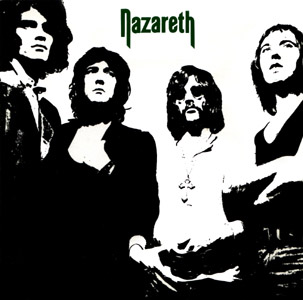
by Jason Hillenburg
(April 2015)
If you ask Nazareth bassist and founding member Pete Agnew what it means to be Scottish, he'll say ‘not to be English.’ His answer hides the secret to Nazareth's appeal and longevity. Those who enjoy music while listening with a critical ear are often dissecting the merits of individual performers. We love hierarchies, but our obsession with segregating music based on its artistic aims naturally says more about ourselves and frequently overlooks simple, objective truths.
The stamp of sincerity marks every track on the band's self-titled debut. The traditional knock on this album is that the stylistic diversity goes nowhere; the band tries everything and the result is an interesting, but flawed, hodgepodge. Flashes of Nazareth to come, such as the simmering swamp rock of "Witchdoctor Woman" or the barrelhouse rumble of "Dear John," raise their heads for the first time, but an assortment of forays into country and folk music dominate the majority of the album. Pairing material like that alongside songs such as "Country Girl," "I Had a Dream" and the string laden closer "The King Is Dead" shows a band with passion and ambition, but the genre-hopping ultimately left a glancing impact. A notable exception is their cover of Tim Rose's folk standard "Morning Dew." This is an early progenitor of their later, more successful cover songs and demonstrates their interpretative powers. Nazareth imbues the song with a sleek electric simmer that contrasts dramatically with vocalist Dan McCafferty's moody vocal.
While Nazareth presented themselves as a complete musical unit from the first album, two members emerged as key figures. The first, McCafferty, cemented his status as a talented, distinctive singer on the debut. His tonsil-shredding rock yowl owes a small debt to the equally rough singer for Family, Roger Chapman, and has since become an instantly recognizable feature of the band. Guitarist and songwriter Manny Charlton is the second key figure on the debut. While the band's other members contributed songs over the years, they remained primarily performers. Charlton's addition to the group represented the final required ingredient for a combustible formula. He entered the group as a blossoming songwriting talent and with the added caveat that the band would focus on original compositions. His wide range of influences filled Nazareth's music with unexpected voices and synthesizing those flavors with his own personality helps distinguish him still as one of the era's finest stylists.
The band's second album, Exercises, carries the debut's ambitions to their logical conclusion. Orchestration is married with social protest on the opener, "I Will Not Be Led," harmonica-driven honky-tonk turns up with "Cat's Eye, Apple Pie," folk influences inspire the narrative "1692 (Glencoe Massacre)" and the album's sole rocker, "Woke Up This Morning," is a mid-tempo humorous romp. Despite enduring critical indifference then and now, the band's sophomore effort is a neglected jewel in the band's crown. McCafferty delivers tour-de-force vocal performances on a number of tracks, particularly the opener, and the material offered proof of the band's artistic growth. Many songs have dramatic, tightly constructed arrangements, and for a band later viewed as wild Scottish rockers, there's a surprising amount of lyrical sophistication This is a much more focused effort - the band nearly abandoned rock music altogether on Exercises, but never betray any audible misgivings.
The release cost them some needed momentum. In response to flagging attention, Nazareth reoriented their musical approach and drafted Deep Purple's bassist and songwriter Roger Glover to produce their third album, Razamanaz. Glover brought much to the direction of this album and its immediate successors. The commercial implications behind their willingness to change musical course is clear, but there's little question that this turn likely illustrated some much-needed truths. The title cut, "Night Woman," and "Bad Bad Boy" established a clear path for the band to harness a more commercial approach without sacrificing every note of musical intelligence. Two superb covers, a stomping take on Leon Russell's "Alcatraz" and a slide-guitar laced stab at Woody Guthrie's "Vigilante Man," are cornerstones of this pivotal release. In the hands of most bands, covers are often throwaways or identical takes on the original. Nazareth, however, never fails to integrate each song into their style so that, in the end, they have only used the initial inspiration as a template rather than a bible.

The band quickly followed up on Razamanaz with Loud and Proud. While it doesn't rank as a failure, the middle entry in their trilogy with Glover manning the boards is a weaker affair than its bookends. Solid but unspectacular songs like "Turn on Your Receiver" and a frantic cover of Little Feat's "Teenage Nervous Breakdown" remain set list regulars. A tandem of covers, Joni Mitchell's "This Flight Tonight" and Bob Dylan's "The Ballad of Hollis Brown," are the centerpieces of this release. The change in career trajectory that came with the success of "This Flight Tonight" is not uniformly positive. The band's long history of covering other band's material has, arguably, two peaks and this is one of them. Nazareth reinvents, recasts, and as before, fully integrates their sensibilities with the work of a radically different artist in both presentation and intent. However, the success of this song and its merit tightened a growing perception that their skill covering other songwriters signaled some sort of limitation. The comparative lack of chart success for their original material is no indictment of its inferiority, but its dearth of originals gave notice to deeper problems brewing.
While the band's final album with Glover, Rampant, failed to spawn another chart hit, it is an unqualified artistic success. Many English acts steeped in rock and blues sported a fascination with American culture and adopted a certain amount of Americana to please US audiences. Rampant's opener, the rollicking "Silver Dollar Forger," is an energetic rocker with lyrics ripped straight from a thousand and one Hollywood crime thrillers. The album's second high point, "Loved and Lost," remains perhaps the band's finest nod to the blues with a wrenching McCafferty vocal and anguished guitar from Charlton.
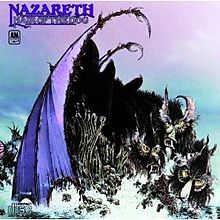
If Razamanaz cracked open a door to commercial success, Hair of the Dog kicked it off the hinges. When casting a glance backwards and viewing this era in rock history, the album had arguably reached its zenith as a form. Releases as diverse as The Rolling Stones' Sticky Fingers, Aerosmith's Toys in the Attic, Led Zeppelin's fourth album and Blue Oyster Cult's Agents of Fortune, among others, demonstrated that forty minutes of guitar driven music could be a cohesive and life-changing experience rather than a momentary distraction.
Nazareth joined that list with this album. Only smatterings remained of the band that wrote and recorded the first two albums and, instead, the music's character plays like a magical distillation of the energy and skill poured into the band's post-Razamanaz work. Manny Charlton handled the production and drew from the strongest originals Nazareth had yet penned. The swinging crunch of "Changin' Times" masked a wry take on hot button gender issues, "Miss Misery" powered through on the back of McCafferty's blood and guts bellow, and the title cut (later covered by Guns N’ Roses) still packs a wallop thanks to Darrell Sweet's propulsive drumming, concise power, and irrepressible swagger.
A monolith lurks in the track list. The effects from their cover of "Love Hurts," first popularized by The Everly Brothers, are incalculable. The performance traveled the world and pushed the band for the first time into the American Top 10. Historical tendencies to view the song as a proto-power ballad aren't completely without merit, but poorly characterize the track. It is more accurate to describe "Love Hurts" as symphonic pop, a theatrical pastiche of the Everly's heyday mixed with bluesy gravitas.
Paying for their success meant never being free from "Love Hurts." The joys of fame are often short-lived, but their fuse burns faster after realizing sustaining its rewards requires offering constant tribute to the source of your notoriety. You can tune out your higher impulses, sink into a bunker mentality and just keep the train rolling. On the other hand, you can push back and stand your ground.
Close Enough to Rock and Roll and Play the Game are the sound of a band pulling back. Only "Telegram," from the former, matches the quality heard on Hair of the Dog. Covers, particularly on the latter album, overwhelmed dwindling and sometimes clichéd band originals. The punishing workload placed on Nazareth and other contemporaries worked practically as an industry paradigm, split up exhausted groups, or crippled their songwriting. If you hear them pulling back, you can hear them panting as well. This is the sound of a great band exhausted and playing it safe.
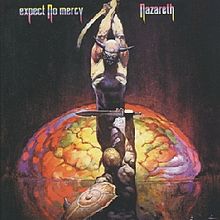
Another turning point arrived in 1976 when the band's longtime manager and financial steward, Scottish bingo millionaire Bill Fehilly, died in a plane crash. His cool confidence and steady hand guided the band's ascent and proved irreplaceable. It isn't difficult to imagine that 1977's Expect No Mercy reflected some of the resulting grief and uncertainty. Damaged or malevolent characters populate songs with pumping bass lines and knife-edge guitar steeped in dread. While some describe the album as the band's first meaningful foray into heavy metal music, it scarcely qualifies. "New York Broken Toy," "Kentucky Fried Blues," "Revenge Is Sweet" and the sweeping title cut are rugged, unforgiving blues. The growing air of exhaustion heard on the preceding two albums has disappeared from the music and, instead, became one of its subjects. The result is Nazareth's last great album of the decade.
Citing burnout from songwriting, production, and playing guitar, Manny Charlton pressed for the addition of a second guitarist and the band settled on a seemingly unlikely choice. Zal Cleminson, guitarist and showman extraordinaire The Sensational Alex Harvey Band, joined the band in time for the recording of 1978's No Mean City. His sole contribution to the album's songwriting, the brilliantly moody "Simple Solution (Parts 1 & 2)," announced a new voice in the Nazareth mix with the potential to elevate the band artistically. His idiosyncratic playing style possessed a certainty of touch that integrated itself with the band's bedrock sound and, in Charlton, Cleminson found a strong creative partner. The addition of one of the best songwriters and musicians then working proved a shrewd move.
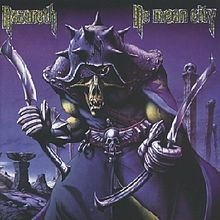
The songwriting strength on the preceding album appeared here to a lesser degree. However, "May the Sunshine" is essential listening, an infectious instant standard that soars with impressive vocals and a mysterious, beautifully simple timelessness. The Charlton/McCafferty written "Star" and the band-penned title cut are other highlights showing the core unit continuing to write well.
If any self-appointed juror remained skeptical about Zal's presence, the release of 1980's Malice in Wonderland brushed away any lingering doubt. Cleminson's fingerprints are everywhere here. His three contributions, "Showdown at the Border," a remarkably credible reggae song "Big Boy" and the gorgeous ballad "Heart's Grown Cold" rank among the album's highlights. The key song to the album is "Holiday," a deceptively simple and musically inventive romp bubbling over with biting humor. The album has aged well and stands as one of the band's clear songwriting peaks.
The band employed renowned guitarist Jeff "Skunk" Baxter (Doobie Brothers, Steely Dan) to produce Malice and his work marked a significant shift in the band's sonic priorities. Nazareth answered the changing tastes of the record companies and the buying public by cleaning up their studio sound, stripping down their sound, and releasing more commercially minded fare. Cleminson's departure following the tour didn't prompt any change in direction and the band enlisted Baxter's production skills once again for 1981's The Fool Circle.
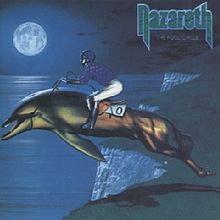
While not as strong as its predecessor, a quasi-conceptual structure and a handful of challenging songs distinguish Fool Circle. A number of the tracks concern themselves with the then-longstanding tension between the Soviet Union and Western counterparts. "Let Me Be Your Leader" succeeds largely thanks to its strong groove, but other songs like McCafferty's "Moonlight Eyes" and Charlton's "Another Year" are among the band's finest songs. The latter, in particular, has maturity and weariness unheard in Nazareth songs until then. McCafferty's mournful vocal goes a step too far, bordering on a whine, but the unusual melody and strong lyrical content carry it far.
Change followed this album. Once again, the band drafted a second guitarist and songwriting into the fold, Billy Rankin (who would later have a mid ‘80’s hit with “Baby Come Back"). The young and supremely talented guitarist held his own playing alongside veteran arena rockers, but other studio contributions proved equally important. Onetime keyboardist for Spirit, John Locke, joined the band for the first of two albums with Rankin, 1983's cleverly titled 2XS. Despite charting with the ballad "Dream On," blurriness creeped into the band's music with this effort, a sense of seasoned performers fumbling in the face of mammoth global changes. The lack of focus grew with the follow-up, Sound Elixir. This album, released later that same year, recalls the freefall heard on Play the Game seven years before. The tumbling commercial standing of the band put them on the defensive and, instead of embracing covers like before, Sound Elixir showed a band experimenting out of fear and never settling on one approach.
Rankin's departure following Sound Elixir marked another turn in the band's history. After six years, Nazareth became a four-piece once again, but the landscape in 1984 had radically changed. Rock music, as practiced by Nazareth and their ilk, limped through much of the decade in near-genre wide creative and commercial decline. Like other longstanding outfits, the band tried modernizing their sound and orienting themselves towards the marketplace without surrendering their core approach.
Few of these bands successfully struck such a balance, but 1984's The Catch achieved it. This outstanding effort featured radio-ready tracks with high production values and considerable musical snap. The pulsing keyboard-laced "Party Down" disguised an intelligent lyric about over-indulgence and self-destruction. The sleek, white-knuckle tight "This Month's Messiah" excels thanks, in part, to McCafferty's snarling vocal. The Catch scores with another strong cover, a faithful rendition of The Rolling Stones' "Ruby Tuesday."
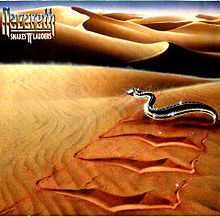
1986's release Cinema saw the band attempting to build off the previous album's sound, but excepting the title track, the material scaled few of the same heights. While nothing reeked of outright shoddiness, the band sounded relatively uninspired. The situation worsened with label difficulties and 1989's Snakes 'n' Ladders, a half-realized album of failed experiments, clumsy social commentary, and rehashed rockers. Charlton, souring on the band's climate and professional problems, left in 1990.
Events that threatened to spell an end for the band actually heralded a new beginning. The remaining members drafted former guitarist and songwriter Billy Rankin back into the fold and responded with 1991's "comeback" No Jive. Nazareth jettisoned keyboards from the mix and returned to a guitars-first mindset that produced a collection of slick, top shelf AOR rock.
Move Me followed in 1994, but despite another strong showing, the band's commercial appeal had shrunk to continental Europe and Rankin decamped shortly before the tour commenced. The band brought in young Scottish guitarist Jimmy Murrison as his replacement. An unknown commodity at the time of his hire, Murrison seamlessly filled the breach with confidence and high caliber playing.
1998's Boogaloo marked Murrison’s studio debut. The album failed to stir much mainstream attention, but Murrison's exceptional guitar work and the addition of Ronnie Leahy on keyboards headlined their freshest new release in years. Tragedy struck on the album's tour when drummer Darrell Sweet collapsed and died shortly before a southern Indiana gig and the devastated band canceled its remaining shows before returning to Scotland.
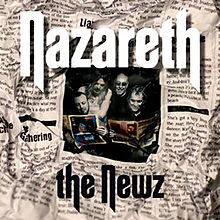
When they re-emerged in 1999, bassist Pete Agnew's son Lee joined them on drums. The band returned to its four-piece incarnation shortly thereafter and, despite having no record deal, continued to work a heavy touring schedule in Europe and South America. Their eventual return to the studio for 2008's The Newz did not disappoint. It marked an unexpected return to form fueled by super performances from original members McCafferty and Pete Agnew and the emergent songwriting team of Murrison and Lee Agnew. Past and present collide to spectacular effect on gems "See Me" and "Keep on Travellin'" while other highlights "Day at the Beach" and "Liar" illustrate how well the newest additions integrated themselves into the band's approach.
The second album from this lineup, 2011's Big Dogz, affirmed the virtues of the previous release while expanding on its promise. The first three tracks are classic Nazareth screamers, but the band stretches into new territory with the apocalyptic "When Jesus Comes to Save the World Again" and the aching "Butterfly."
As the band rode the crest of their impressive comeback, tragedy hit again. Dan McCafferty's progressing COPD reached a debilitating juncture and, following aborted gigs and the 2013 recording of the band's Rock and Roll Telephone album, he announced his retirement from live performance.
Still, the band soldiered on. The album came out in 2014 to a wave of positive reviews appropriately eulogizing McCafferty's swan song and, months before its release, the band regrouped with singer Linton Osbourne. Nazareth toured Europe and North America with Osbourne and, despite initial skepticism, proved there was life after McCafferty.
Osbourne left on good terms in January of 2015 and the band moved quickly to replace him with talented former Krokus singer Carl Sentence. Rapidly approaching the half century mark as an active performing unit, Nazareth have weathered changing fortunes with the same tenacious spirit that helped them find the limelight.